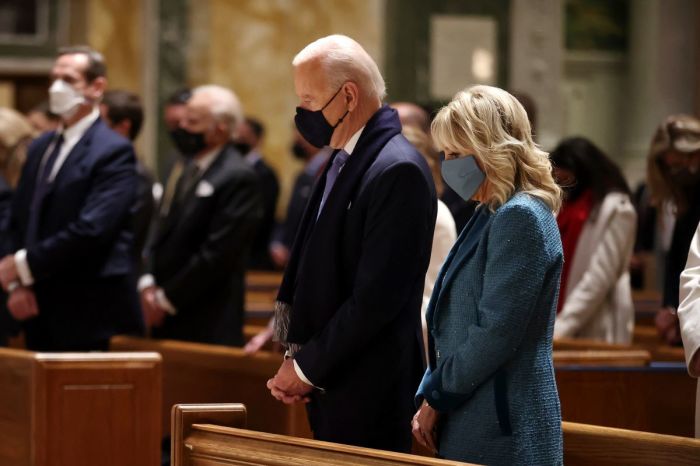US Catholic Bishops expected to advise denying communion to pro-abortion politicians

United States bishops are considering formalizing their opposition to pro-abortion Catholic politicians receiving communion as they continue to speak out against President Joe Biden, a Catholic, over his support for abortion.
The U.S. Conference of Catholic Bishops, scheduled to hold a national meeting in June, is considering approving a draft document that would advise Catholic politicians who support abortion not to receive communion. The consideration of the document comes as Biden continues to advocate for liberal abortion policies that directly conflict with the teachings of his faith, specifically, that all human life is sacred from natural conception until natural death.
According to Archbishop Joseph Naumann of the Archdiocese of Kansas City, who chairs the USCCB’s Committee on Pro-Life Activities, advocacy for abortion constitutes a “grave moral evil.” Naumann told The Associated Press that “Because President Biden is Catholic, it presents a unique problem for us.”
“It can create confusion … How can he say he’s a devout Catholic and he’s doing these things that are contrary to the church’s teaching?” Naumann asked. The Catholic Church’s Code of Canon Law teaches that those who are “obstinately persevering in manifest grave sin are not to be admitted to holy communion.”
According to the USCCB website, “The body of bishops meets typically twice a year for a General Assembly to transact its business and address matters of concern within its civil and canonical mandates.” This year’s USCCB Spring General Assembly will take place from June 16-18.
Naumann told the AP that at the General Assembly, the bishops will vote on whether to continue working on the document, so it can be presented to the public at a later date. The rules of the General Assembly require proposals to receive a “two-thirds majority vote of those bishops present and voting.”
Even if the USCCB approves the document, it “would still leave decisions on withholding Communion up to individual bishops.” Individual churches and dioceses have taken different approaches regarding communion for Catholic politicians who support abortion.
A priest in South Carolina refused to give Biden communion when the then-presidential candidate visited his church on the campaign trail, citing his support for abortion as the reason for withholding communion. However, Cardinal Wilton Gregory of the Archdiocese of Washington said that he would allow the then-president-elect to receive communion despite his advocacy on behalf of a practice that the Church steadfastly opposes.
While Catholic bishops as a whole have demonstrated opposition to allowing Biden to receive communion, a recent poll conducted by the Pew Research Center revealed two-thirds of American Catholics believe that Biden should be able to receive communion despite his position on abortion.
Biden, the second Roman Catholic to serve as president, has frequently found himself at odds with the Church and the broader Catholic community due to his positions on social issues extending beyond abortion. This divide has manifested itself in exchanges between EWTN’s White House Correspondent Owen Jensen and White House Press Secretary Jen Psaki at the White House press briefings.
Most recently, on Tuesday, Jensen asked Psaki to react to criticism of Biden from the USCCB over his administration’s decision to lift “the ban on researchers using fetal tissue from elective abortions.”
Psaki rejected the USCCB’s contention that it's “deeply offensive to millions of Americans for our taxpayer dollars to be used for research that collaborates with an industry built on the taking of innocent lives.”
“I think the White House … respectfully disagrees and we believe that it’s important to invest in science and … look for opportunities to cure diseases,” she responded. In addition to his support for abortion, Biden has come under fire for his support for the Equality Act, a wide-reaching legislative initiative that critics warn has negative implications for religious liberty. Jensen has repeatedly pressed Psaki about Biden’s position on such concerns.
At a White House press briefing earlier this month, Jensen asked Psaki if Biden had a message for “Catholic doctors, [and] Catholic institutions who are fearful that if the Equality Act passes, it has the potential to trample on their conscience rights.” In her response, Psaki maintained that the president has a “difference of opinion” with those who have those concerns while reiterating that “he has been a supporter of the Equality Act, and he also is a practicing Catholic and attends church nearly every week.”
In March, Jensen told Psaki that pro-life groups were “very concerned about the phrase ‘pregnancy discrimination’ in the Equality Act — that it would force doctors to perform abortions even if it violates their conscience.” Also mentioning concerns that the legislation would “force doctors to perform gender transition surgeries and sterilizations, again, even if it violates their conscience,” Jensen inquired as to whether the president wanted to address the aforementioned concerns.
Psaki did not directly answer the question, instead describing Biden as “a long supporter of Roe v. Wade” and highlighting his “consistent belief that [Roe] should be law.” She also declined to respond when Jensen asked if the president wanted to weigh in on “conscience concerns.”




























